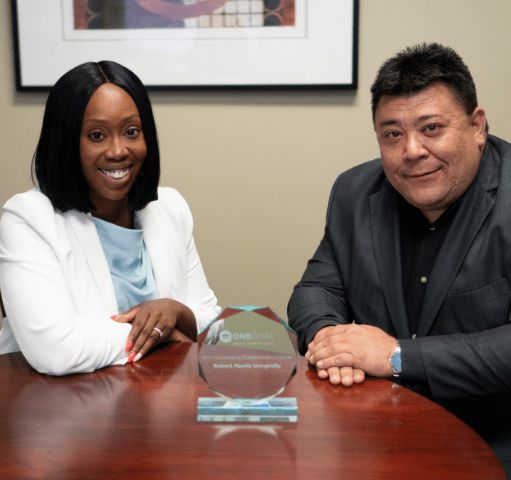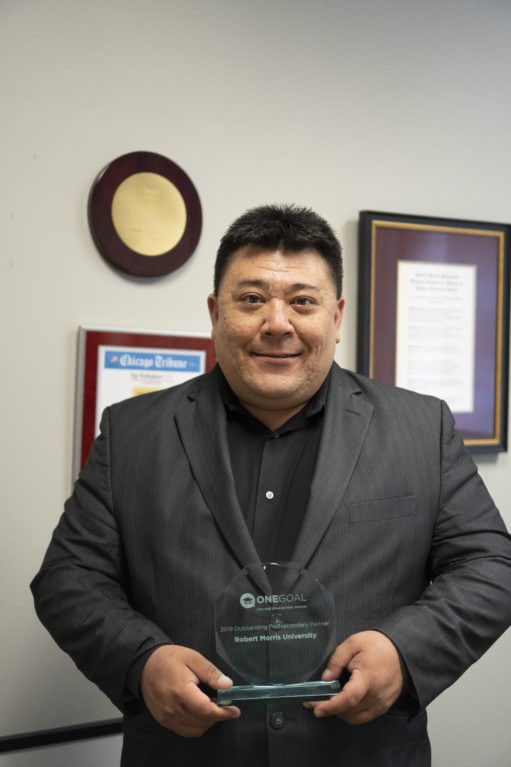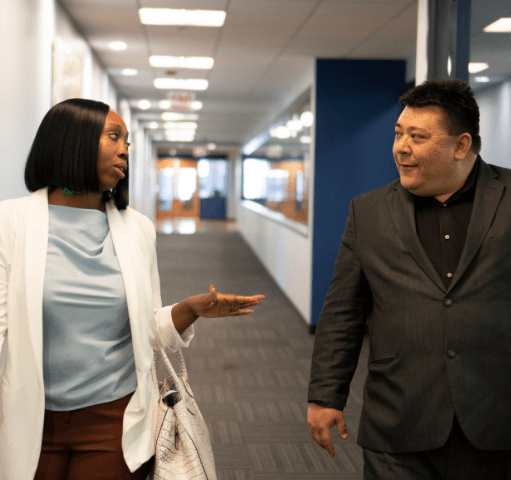It Takes a Village
By Dominique Myles
September 11, 2019
When it comes to closing the college degree divide, we can’t do it alone, which is why we strategically partner with local colleges and universities who are invested in our students’ success. One such partnership is our work with Robert Morris University, located in the heart of downtown Chicago. Read this conversation between Dominique Myles, Senior Director, Postsecondary Partnerships for OneGoal in Chicago and Andy Berger, Vice President of Admissions and Recruitment at Robert Morris University to learn more about how and why this collaboration works.
Dominique Myles: Let’s start at the very beginning, we’ve been working together for a few years now. How did this partnership come about?
Andy Berger: We started back in 2016 when the leaders of each organization met to better understand each other’s mission and student learner goals and our best practices in supporting students through college.
It was very obvious we’re both working to improve student retention and graduation outcomes. We’ve come a long way since then and we’ve made pretty substantial modifications to our partnership that are ultimately helping the students we serve together.
DM: And we’re helping students overall, not just OneGoal students, which is one of my favorite things about how this partnership has evolved.
The work we’re doing — being thoughtful and critical of our approach — is impacting all of your students who share similar challenges. It’s a systems-level change.


AB: About half of our enrollment comes from largely underserved Chicago Public Schools students. Our initial conversation with OneGoal resulted in a $6,000 scholarship opportunity for OneGoal freshman enrolled at Robert Morris with a 2.7 GPA and a recommendation letter, but it was not renewable beyond that first academic year and it wasn’t able to be combined with other Robert Morris financial awards.
But when you and I started working together in 2017, we discussed what was working and what was not working and talked about the possibility of stacking scholarships. Now the $6,000 partner award can be combined with other Robert Morris scholarships through graduation of a bachelor’s degree. And we’ve seen the direct result of retention by changing the financial component.
DM: That’s been one of the highlights of our partnership for me as well. A huge part of that was your willingness to reflect on the data and consider what you could do in your role and what Robert Morris could do as an institution.
This was a really critical aspect and I’m wondering, had that not been the case, would you have been able to see the financial component as a barrier?
AB: I have to give all credit to the individual Program Directors themselves. As part of the partnership, I had the opportunity to go into OneGoal classrooms.
The teachers made it clear that students love Robert Morris as much as any school and truly want to enroll, but the costs had to be in a certain range. It got us thinking about those parameters and present to our President’s Council some options about what we could do. The first phase started with that feedback.
DM: That’s incredible. Why do you continue to partner with OneGoal?
AB: There’s a commonality of vision and mission. The students we serve are really the same. We both realize why we’re doing this, why we’re in this industry. And our purpose, as leaders of our organizations, is to improve the numbers from where they are currently. Neither of us is happy until 100 percent of OneGoal Fellows graduate from college. We believe that, in addition to the changes being positive, it ultimately goes back to the students who are served. We’re able to positively serve a larger number of CPS graduates and OneGoal Fellows.
DM: And why do you believe a postsecondary education is so important?
AB: The biggest thing is that it truly opens up career-focused options. A large percentage of the students we serve together are first-generation college students. There’s no reason why every graduate out there shouldn’t have the opportunity to earn a college degree. If that’s what they want as an end goal, there’s no student who shouldn’t be afforded that opportunity from a financial standpoint and an acceptance standpoint. A postsecondary degree creates more opportunities for that student, their families and their communities as a whole.

If you’d like to bring OneGoal to your college or university, learn more here.